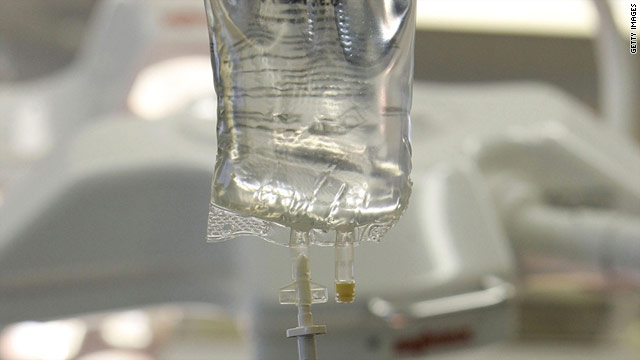Role of IV solution in 9 Alabama patient deaths may never be known

- NEW: "We don't know, and may never know," says chief medical officer of the Baptist Health System
- The investigation is ongoing
- The outbreak was reported March 16
- The product was recalled Thursday and no longer poses a threat, a state health official says
(CNN) -- As health officials continued their investigation into what role a bacterial infection may have had in the deaths of nine hospital patients and the infection of 10 others in six Alabama hospitals, one official acknowledged that they may never find out.
"We don't know, and may never know, if the Serratia marcescens bloodstream infection played a role in the deaths of these patients," Dr. Elizabeth D. Ennis, chief medical officer of the Baptist Health System, said Tuesday in a statement.
She was referring to the infection caused by rod-shaped bacteria that were discovered in bags used in intravenous feeding -- also referred to as total parenteral nutrition. The infection would have entered the bloodstream easily and "with a pretty quick effect in terms of blood pressure and temperature," said Dr. Donald Williamson of the Alabama Department of Public Health in a conference call Tuesday night with reporters.
But the products no longer pose a threat to anyone who has not already been identified, he added. It was not clear how many people in all had been administered the solution, he said. The infected IV bags have been removed from the hospitals and the product has been recalled, he said.
"For the pharmacy and these patients, this is now a closed loop," he said. "The bigger challenge is how did this happen, and what can be done to reduce the risk of contamination in the future."
 IV bags blamed for deaths
IV bags blamed for deaths
 Contaminated IV bags kill nine
Contaminated IV bags kill nine
The nutrition product, which was recalled last Thursday, was made by Birmingham, Alabama-based Meds IV, which did not respond to phone calls left Tuesday and Wednesday; its website was offline on Wednesday.
Of the five patients at Shelby Baptist Medical Center who were infected, two died; of the seven infected at Princeton Baptist Medical Center, four died, Ennis said.
Of two cases at Select Specialty Hospital, one died; of three cases at Medical West Hospital, one died; the one case at Baptist Prattville proved fatal, but the one case at Cooper Green Hospital did not die, said Dr. Jim McVay, director of healthy promotion and chronic disease for the Alabama Health Department.
Baptist Prattville, 80 miles south of Birmingham, was the sole hospital outside the Birmingham area.
The outbreak was identified March 16 when two hospitals reported unusual cases of bacteria among high-risk patients -- an outbreak that had begun in late January, according to McVay. Patients who get the product are typically already very sick, McVay said.
Williamson praised those involved. "This is actually the way the system should work," he said. "In this case, a couple of hospitals identified that they were seeing what they perceived to be an unusual number of cases of serratia marcescens bacteremia.
"When they saw that, they contacted us and the CDC and we contacted the CDC and very quickly you got the shutoff of the production of the product, the cessation of use of the product and then you quickly got an investigation done to identify both what the most likely source was as well as where the source came from and some idea of the magnitude of the problem."
CNN's Craig Bell contributed to this report
